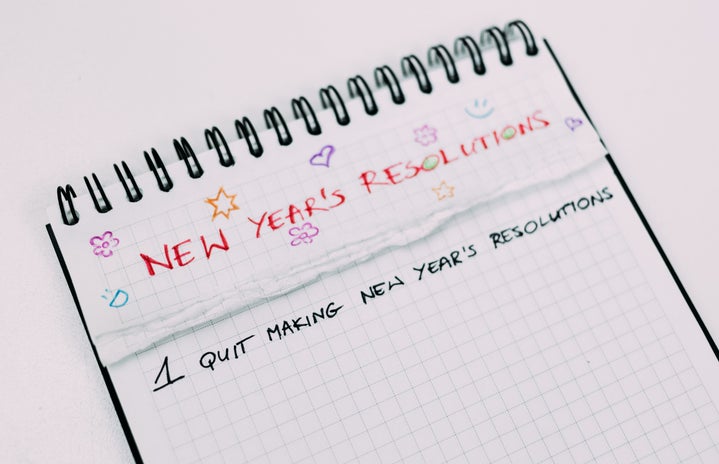There’s no doubt in my mind that New Year’s resolutions are popular. Next to Christmas parties and New Year’s parties, setting resolutions is on most people’s December to-do lists. Even back in primary school, before I could quite spell the word, I was setting resolutions with my teacher and fellow classmates—writing them on fancy paper with Crayola markers. And while my New Year’s resolutions have drastically changed in this past decade, they all have something in common—none of them ever lasted.
Maybe you’ve experienced the same thing. You get all excited at the end of the year, buy that new agenda or yoga mat, that new sketchbook or how-to book, and tell yourself that this is the year. This is the year that you get organized, that you exercise, learn to draw, and teach yourself that skill you’ve been so interested in for the past decade… But it never quite works out. New Year’s resolutions expire by February, and you’re left comforting yourself with the intention of doing better next year. Still, nothing changes.
Why? Why are New Year’s resolutions so popular, and why don’t they work? Well, to boil it down in one answer: they’re superficial. Popular culture has made yearly resolutions a “thing.” Celebrities are posting their goals online, YouTubers make videos discussing them, and they’re at the beginning of every bullet-journaler’s journal. People are in love with the idea of “new year, new me,” but there’s no such thing. There is never a “new” you, only a better version of you, and that kind of positive change takes time and dedication to manifest. This saying inadvertently implies that the change happens overnight, and it’s this wishful and optimistic attitude that characterizes New Year’s resolutions. It turns them into wishes, rather than goals.
Besides being dreams, New Year’s resolutions give people an excuse to give up. “It’s two weeks into my diet, and I’m already eating chocolate for dinner—oh well, there’s always next year.” I see posts like this every January when I scroll in my Facebook feed. As many people as the New Year compels to start wishing for change, it also hinders. For some reason, once you mess up, an invisible rule dictates you must wait until January of the following year to start again.
With such a high participation level and such a low success rate, resolutions also earn the reputation of being unserious and unimportant. When you say you’re setting a resolution, there is a quiet expectation of failure lingering around you, and when you fail, you don’t really mind—everyone else fails, too.
Now, I don’t mean to be a Debbie Downer. If you’ve already set your resolutions for the year, then well done. Stick to them, and I wish you all the best. But don’t call them resolutions if you’re serious—call them goals. As similar as the words seem, there is an important difference. According to Google’s dictionary, a resolution is an aspiration, a resolve, a determination… whereas a goal is the object of someone’s ambition—an aim, or a target. Already, the difference should be clear: a resolution has no direction.
In reading many books and articles on the topic of goals and goal-setting, I have found that a common theme many authors discuss is planning and visualization. Goals get into the gritty details of exactly what you want, by when you want it, and how you will get there. It’s a clearly outlined process, and once you see this path before you, following it isn’t as tricky. The same can’t be said for resolutions.
So don’t set resolutions—set goals. Think about exactly what you want, visualize it so that all the details are crisp and clear, so that you know where it is you’re going. Plan your route; break down your goal into small steps so that you’re not overwhelmed with the extensive distance you need to cross, and know that you’ll get there. People do seemingly impossible things every day, and as long as you’re alive, you’ll do impossible things too.
Just remember: it’s always nice to have an aspiration—but it’s always better to have a plan.


